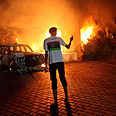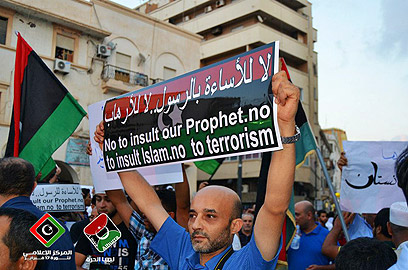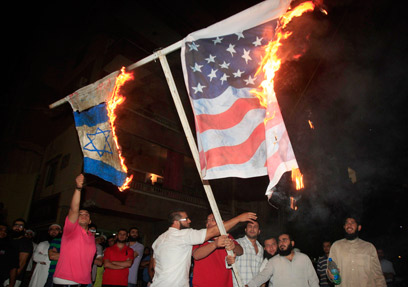
Muslims' sensitive issue
Op-ed: Any attempt to ridicule Prophet Muhammad blurs line between extremist, moderate Muslims
The depiction of the prophet Muhammad has always been a sensitive issue for Muslims around the world. In making the best-known Hollywood movie about Muhammad, "The Message" (1977), the filmmakers were cautious not to include an image of the prophet's face. Any attempt to mock or demean the prophet sparks a wave of rioting worldwide. This is not the case when movies that ridicule Judaism and Christianity are released. Why are Muslims so protective of Muhammad's honor when they admit that he was a man of flesh and blood?
The riots in Benghazi exposed the alarming presence of al-Qaeda elements in Libya. When the "Arab Spring" erupted in Libya last year, Muammar Gaddafi warned that al-Qaeda would take Libya over if he is overthrown. US intelligence agencies were also aware of the presence of al-Qaeda elements in Libya and knew of their training in Afghanistan – as the Wikileaks documents revealed.
Following the brutal killing of Gaddafi, the black flag of al-Qaeda was seen flying atop the courthouse in Benghazi.
The Americans were also aware that the rebel leader in Benghazi, Abdel Hakim Belhadj, was a former al-Qaeda member who was released by Gaddafi in 2010. The CIA knew that the terror group was getting organized in the poor and neglected areas of east Libya. There is no doubt that the attack in which the US ambassador was killed required a lot of planning, including surveillance and intelligence gathering. The timing of the attack, a day after the anniversary of the September 11 terror attacks, was not coincidental.

Demonstration in Benghazi (Photo:
The riots over the film about the prophet Muhammad exposed a serious problem that is deeply-rooted in the Arab revolutions. The "Arab Spring" is essentially made up of three echelons: The popular echelon, which carries out the social struggle; the Islamic stratum, which is in charge of the political aspect and ensures a victory for Islamist movements in the elections that follow the collapse of the regime; and the extremist Islamist echelon, which is usually clandestine and symbolizes al-Qaeda's attempt to take advantage of the revolutions to intensify its terrorist activity and global jihad.
The terror attack in Benghazi was a very severe US security blunder, but encouraging the Arab revolutions does not serve Washington's interests because it creates and Islamic infrastructure in the Middle East.

Protest in Lebanon against film (Photo: AP)
To understand how a silly, low-budget movie can offend so many Muslims around the world, one must understand Muhammad's status within Islam.
According to the Muslim faith, all of Islam is founded on a message passed on to Muhammad by the archangel Gabriel when the prophet was 40 years old. Muslims adhere to all the sayings and practices that have been attributed to Muhammad since then. To avoid any possibility that believers will be led astray, Shariah (Islamic law) determined that the prophet was infallible. According to Islam, the archangel Gabriel watched over Muhammad to make sure he did not err.
The film also angered Muslims because the prophet Muhammad and the members of his inner circle symbolize the golden age of Islam and the beginning of the Muslim empire of the Middle Ages, which was considered a pinnacle of culture until the 12th century.
Any insult to the prophet reminds Muslims that the Islamic world has been inferior to the West since the 19th century and of their dream that Islam will reclaim its cultural, political and military superiority.
In Muslim eyes, any attempt to mock the prophet Muhammad legitimizes acts of terror, such as the one carried out by al-Qaeda, and blurs the line between extremist and moderate Muslims.
The coming years will likely see a struggle between the two Islamic echelons which took over the "Arab Spring": The so-called "moderate" Islamic movements (mainly the Muslim Brotherhood) which seize power in the Muslim countries, and elements linked to al-Qaeda and global jihad. Such a struggle is already evident in northern Sinai. In the meantime, the West will have to be very cautious regarding anything that is related to the prophet Muhammad, particularly because he symbolizes the honor of 1.4 billion people.
Dr. Yaron Friedman is a graduate of the Sorbonne. He teaches Arabic and lectures about Islam at the Technion, at Beit Hagefen and at the Galilee Academic College. His book, the Nusayri Alawis: An Introduction to the Religion, History and Identity of the Leading Minority in Syria, was published in 2010 by Brill-Leiden.










